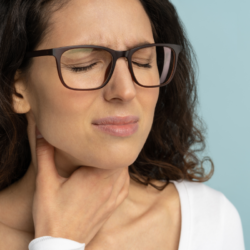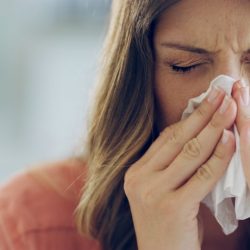Acutelaryngitis and tracheitis, characterised by rapid bouts of dry coughing, are common ailments that affect many people every year. In our search for effective, natural solutions, homeopathy offers a promising alternative. This gentle treatment, derived from natural sources, is renowned for its holistic approach to health, targeting not only the symptoms but also the underlying cause of the infection. In this article, we’ll explore in detail how homeopathy can offer significant relief in the treatment of acute laryngitis and tracheitis, focusing on specific remedies and their dosages. Whether you’re a long-time devotee of homeopathy or considering this approach for the first time, the information provided here offers valuable insight into natural treatment options for these common respiratory conditions.
The benefits of homeopathy
Homeopathic remedies are natural, safe and have no unwanted side effects. What’s more, they can help boost the immune system and prevent recurrences of infection. Unlike conventional treatments that focus on suppressing symptoms, homeopathy treats the underlying cause of the infection and helps the body heal naturally.
- Natural and gentle approach: One of the main advantages of homeopathy is its gentle and non-invasive nature. Unlike conventional medicines, which can sometimes be harsh on the system, homeopathic remedies, made from natural substances, offer a gentler alternative suitable for all ages, from the youngest to the oldest.
- Holistic treatment: Homeopathy does not limit itself to treating isolated symptoms; it aims for a holistic approach to health. By considering the individual as a whole, including their physical symptoms, emotional state and medical history, homeopathy seeks to restore the body’s overall balance. This holistic approach often allows the underlying cause of laryngitis and tracheitis to be treated, not just the symptoms.
- Safety and Absence of Undesirable Side Effects: Homeopathic remedies are known for their high safety profile. They are free from the side effects often associated with traditional medicines, making their use particularly attractive to those concerned about adverse drug reactions.
- Boosting the immune system: As well as treating acute symptoms, homeopathy can also help boost the immune system. By stimulating the body’s natural ability to defend and heal itself, homeopathy helps prevent recurrences and maintain robust respiratory health in the long term.
- Personalised treatment: Each homeopathic treatment is personalised. The choice of remedy depends on the patient’s specific set of symptoms, ensuring a more targeted and effective treatment. This personalisation is crucial, as it allows the various manifestations of laryngitis and tracheitis to be addressed according to individual needs.
- Prevention and long-term care: As well as treating acute conditions, homeopathy is also used for prevention and long-term care. It can help to minimise the frequency and intensity of future flare-ups of symptoms, providing ongoing management of respiratory health.
Specific treatment for febrile laryngotracheitis
The onset of cough and fever occur at roughly the same time.
Aconitum napellus :
Pathogenetic experimentation withAconitum produces, after shivering, a very rapid onset of high hyperthermia with cardiac erethism, redness and heat of the skin, which is dry, intense thirst (for cold water) and sthenic agitation. Simultaneously, a hoarse, dry, croupy cough occurs. This is often seen after a sudden chill, and often starts at night (around midnight or 1am), waking the patient, who then becomes anxious; earache may also be present.
Dosage: Take the medicine in medium dilution (7 or 9 CH), as there are both local and general symptoms, in doses of 5 granules repeated every half hour or every hour, until sweating appears, which indicates that Aconitum should be replaced by Belladonna. If the cough has a characteristic modality described in the study of homeopathic medicines for acute laryngitis and tracheitis, alternate Aconitum with the appropriate symptomatic medicine.
Belladonna :
The pathogenesis of this homeopathic medicine causes a very rapid onset of hyperthermia which progresses in bells, with cardiac erethism and cephalic congestion accompanied by pulsating pain, redness and radiant heat of the skin which sweats especially on the face. There is also dryness of the mucous membranes, leading to intense thirst, a short, dry cough, tingling in the throat and dysphagia. There is photophobia due to mydriasis, sensory hyperaesthesia (to noise, touch, shaking) and agitation with the possibility of delirium or depression.
Dosage: Take the medicine in medium dilution (7 or 9 CH), or even in high dilution (15 CH) in a delirious child or one prone to hyperthermic convulsions, in doses of 5 granules repeated every half hour or approximately every hour, then gradually spaced out as the intensity of the symptoms diminishes.
Homeopathic approach to striduleous laryngitis
Striulous laryngitis is a sudden onset of acute dyspnoea due to a sudden inflammation of the larynx, accompanied by a dry, hoarse, barking, screaming cough which is impressive for the patient and those around him. This may be an isolated episode or the beginning of a nasopharyngeal infection. It may or may not be febrile. It is improved by heat in all its forms: warm neck wraps, inhalation of hot water vapour, hot drinks. Finally, it is practically only seen in young people with enlarged adenoids or in nervous children.
Homeopathic medicines are chosen from those whose pathogenesis corresponds to this first stage of inflammation, with a particular tropism for the larynx and improved by heat. This ensures rapid remission and avoids respiratory distress, which is always a possible complication.
Spongia tosta :
This homeopathic treatment is indicated in the presence of a dry, croupy, wheezing cough, comparable to the sound of a saw cutting a fir plank or to that of a dog’s cough. The nasal and pharyngeal mucous membranes are dry: there is a sensation of burning, tightness and suffocation, causing great anxiety. Improvement is observed after hot drinks.
Dosage: Take 5 CH granules every 5 to 10 minutes, possibly alternating with Aconitum or Belladonna if there is a fever associated with the corresponding symptoms. Gradually space out the doses as the intensity of the symptoms diminishes.
Sambucus nigra :
These granules are taken in the presence of sudden suffocation occurring around midnight, with wheezing inspiration, expiration being hampered by thick mucus, difficult to loosen and nasal obstruction. The patient presents with profuse sweating of the face on waking. He cannot keep his head down and sits up in bed, becoming progressively cyanotic . Improvement is seen after applying warm compresses to the front of the neck. Check that this is not epiglottitis requiring a tracheal operation.
Dosage: Take 5 CH granules every 5 to 10 minutes, possibly alternating with Aconitum or Belladonna if there is a fever associated with the corresponding symptoms. Gradually space out the doses as the intensity of the symptoms diminishes.
Hepar sulphur :
This medicine is used when striduleuse laryngitis is accompanied by intense pain in the throat (sensation of a ridge) making the patient angry. Improvement is obtained by inhalation of moist heat and warm compresses. These symptoms are more frequently observed after a sudden chill in children with a difficult character, prone to suppurations.
Dosage: Take the medicine as a single dose at the start of treatment, in a high dilution (15 or 30 CH), because of the risk of underlying purulent otitis, which is always possible; then take the appropriate medicine(s).
Management of cough-inducing laryngitis
Although responsible for coughing fits, there is less inflammation of the larynx than in the case of striulous laryngitis. There is either a permanent tickling sensation in the larynx, or brief laryngeal spasms responsible for coughing fits.
Coccus cacti :
A laryngeal tickle is responsible for a hacking cough bringing up expectoration of stringy, viscous mucus, especially on waking and in the evening around 11pm. The cough is soothed by fresh air or a sip of cold water.
Dosage: Take 5 CH before the usual time for abscesses.
Cuprum metallicum :
This is a spasmodic, dry, coqueluchoid cough, with suffocation and cyanosis due to a laryngeal spasm at the time of the coughs, which are calmed by drinking a little cold water. In children, a pseudoconvulsive appearance may be observed, with spasms of the whole body and a bent thumb in a closed fist.
Dosage: Take Cuprum 7 or 9 CH, 5 granules at the same time as the coughs. Cuprum oxydatum is preferred to Cuprum metallicum when the cough is due to pinworm.
Mephitis putorius :
Occurring approximately every 2 hours, a laryngeal spasm blocks exhalation; thus provoking a spasmodic cough reflex with cyanosis of the face.
Recommended dosage: Take 5 granules of Mephitis putorius 5 CH at the same time as the coughing fits.
Treatment of laryngitis with dysphonia
Let’s now look at a specific but common aspect of respiratory disorders: the treatment of laryngitis accompanied by dysphonia, where homeopathy offers targeted solutions to treat both inflammation of the larynx and voice alterations.
Arum triphyllum :
There is intense inflammation with marked dryness of the lips, rhino-pharynx. There is hoarseness with a bitonal voice. The cough is hoarse. The patient is usually described as biting or scratching his lips until they bleed.
Dosage: Take 5 CH in doses of 5 granules every hour, gradually spaced out.
Ammonium causticum :
This medicine is chosen in the presence of an incessant, suffocating cough, with hoarseness and a sensation of raw mucous membrane in the larynx.
Dosage: Take 7 or 9 CH every hour. Space out as the cough improves.
Treatment of acute tracheitis
Acute tracheitis is microbial-dependent inflammation of the trachea, resulting in a pathology restricted to bouts of dry, exhausting cough, with or without fever. Spontaneous progression may be downstream, towards acute bronchitis.
Acute febrile tracheitis :
Aconitum and Belladonna are naturally found in cases of sudden febrile outbreaks.
-
Bryonia :
The fever progresses gradually and the dryness of the mucous membranes is also responsible for intense thirst. The cough is dry; provoked or aggravated by the slightest movement or by talking and entering a hot room. The cough is painful, causing sternal or thoracic pain, the intensity of which is reduced by compressing the thorax with the hands.
Dosage: Take Bryonia 7 or 9 CH in doses of 5 granules approximately every 2 hours or at the rate of coughing fits. Space out according to improvement. Sometimes combined with Ferrum phosphoricum.
What other uses are there for Bryonia?
- Respiratory disorders: Bryonia is often recommended for cold or flu symptoms, especially when the cough is dry and painful.
- Joint and muscle pain: This remedy can be used for joint pain that worsens with movement and improves with rest.
- Digestive problems: Bryonia can help relieve constipation, particularly when stools are dry and difficult to pass.
- Headaches: It is sometimes used for headaches that worsen with movement and are accompanied by nausea.
- Irritability and desire for tranquillity: Bryonia may be indicated in cases of irritability, especially when the person wishes to remain alone and undisturbed.
Acute non-febrile tracheitis :
Let’s now look at another important aspect of our respiratory ailments: acute non-febrile tracheitis, where homeopathy plays a crucial role in offering gentle and effective solutions for these inflammations without fever.
-
Drosera :
The cough is dry, spasmodic, occurring in mainly nocturnal attacks, while lying down. There is also wheezing and cyanosis of the face. Chest or abdominal pain is relieved by hand pressure.
Dosage: As low dilutions may cause aggravation, Drosera should be taken in at least 9 CH, in doses of 5 granules, or even a 30 CH tube-dose at bedtime.
-
Sticta pulmonaria :
The cough is dry, irritating, incessant, tiring, with dryness of the nasal mucosa. There is a sensation of obstruction of the root of the nose and a feeling of heaviness as if pinched by a pair of binoculars, as well as a constant need to blow the nose to no avail.
Dosage: Take 5 CH granules every hour, often alternating with Bryonia, of which it is a good complement.
-
Rumex crispus :
This natural remedy is indicated when the supra-sternal hollow feels itchy, leading to a continuous dry cough reflex which is aggravated by breathing in fresh air, to the point where the patient breathes through a handkerchief or woollen cloth which he covers over his nose and mouth.
Dosage: Take 5 CH at the same time as the coughing fits.
-
Corallium rubrum :
The cough is violent, spasmodic, explosive, uncontrollable, also accompanied by vomiting of stringy mucus causing redness of the face. The pharynx is red. The patient gets under the covers to avoid the fresh air , which seems to provoke the coughing fits.
Dosage: Take 5 CH at the same time as the coughing fits.
Spasmodic tracheitis due to neurovegetative dystonia
The cough occurs in hypersensitive individuals, in a particular context.
Ignatia amara :
The more the patient coughs, the more they want to cough, describing the impression of having a lump in their throat. Coughing is always paradoxical. For example, the cough is triggered by the smoke of others, but if the patient smokes himself, he does not cough.
Dosage: Take 5 granules of Ignatia 9 CH 1 or 2 times a day.
Hyoscyamus niger :
This is an attack of nocturnal cough, occurring as soon as the patient lies down and ceasing as soon as he sits up.
Recommended dosage: 9 CH, 5 granules before bedtime.
When should I take Hyoscyamus niger granules?
- Behavioural disorders and nervousness: This remedy is often used for symptoms of nervousness, agitation, or strange and eccentric behaviour.
- Sleep disorders: Hyoscyamus niger may be indicated for people who have difficulty sleeping, particularly if these problems are accompanied by agitation or inappropriate behaviour.
- Jealousy and suspicion: It is sometimes recommended for people with intense feelings of jealousy or suspicion.
- Digestive disorders: This remedy can be used for certain digestive problems, particularly if these are associated with a nervous or agitated state.
- Urinary disorders: Hyoscyamus niger may be indicated in cases of involuntary urination, particularly at night or during coughing fits.







